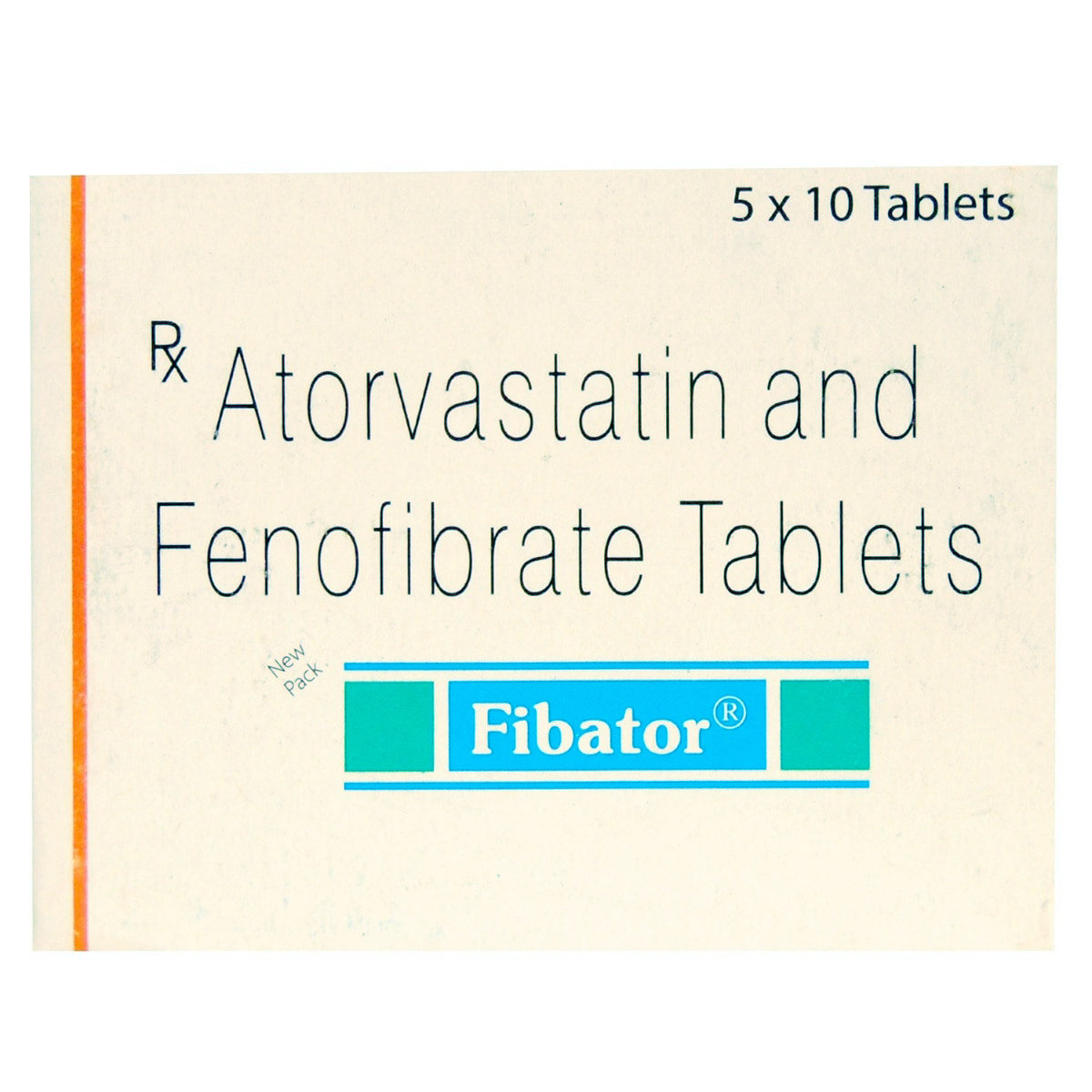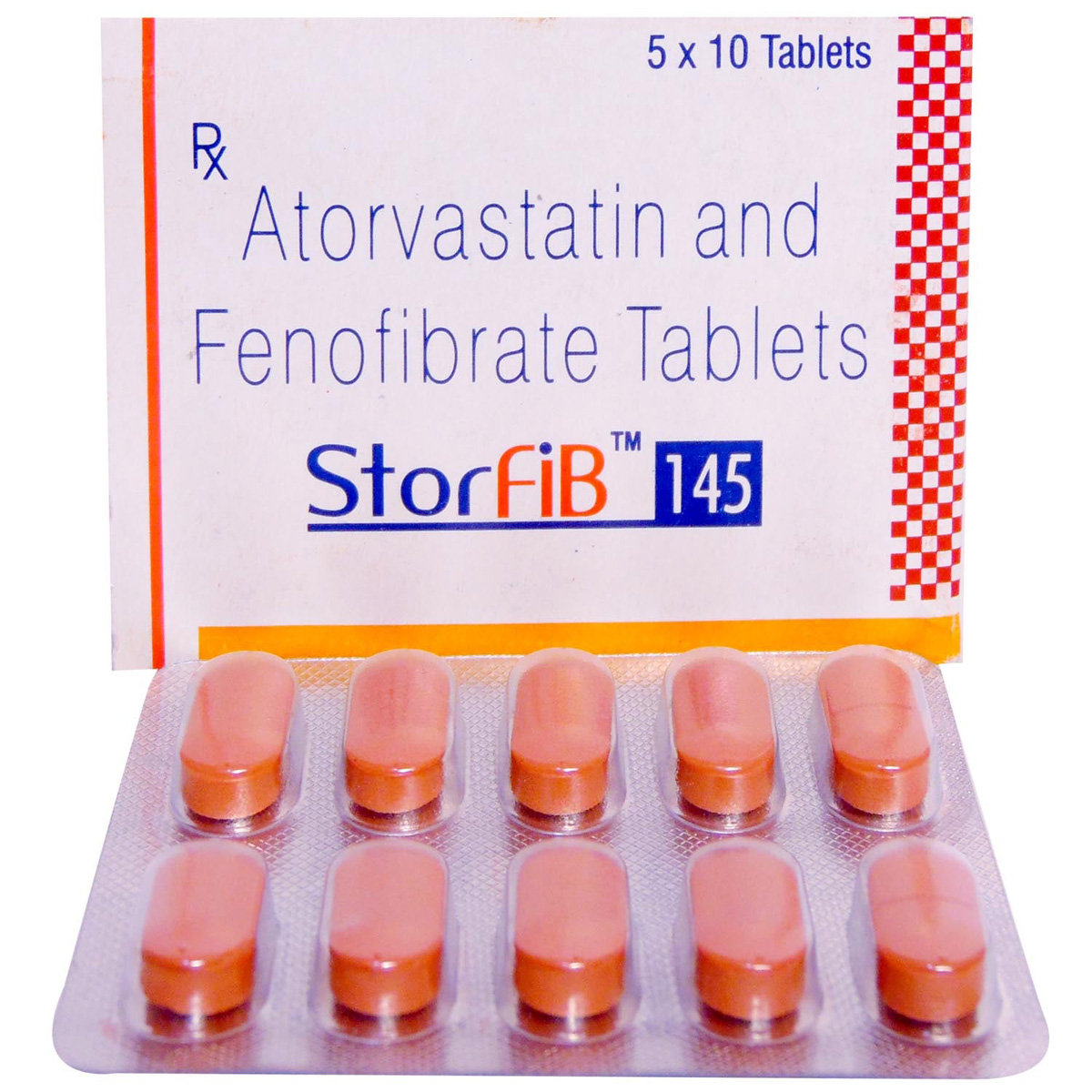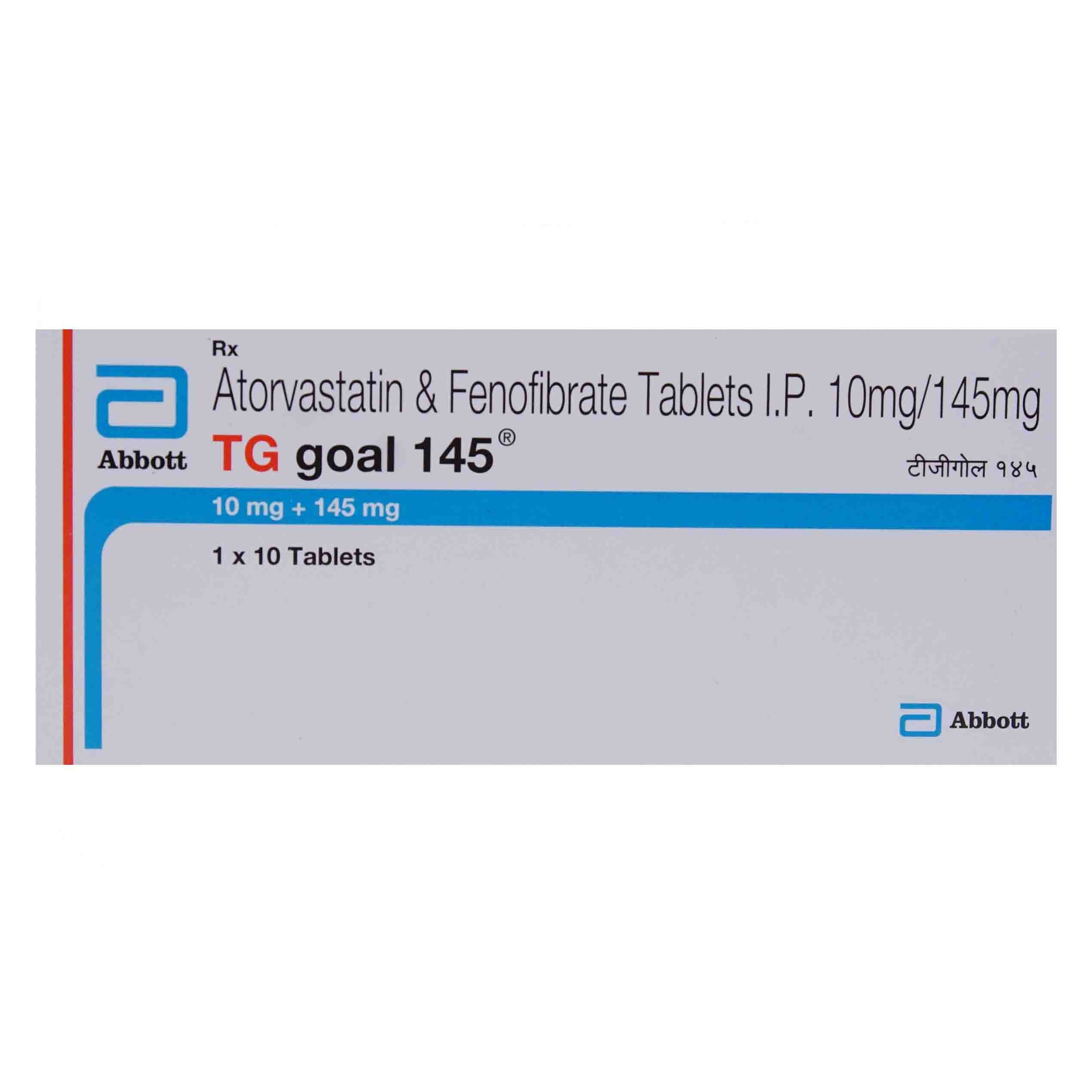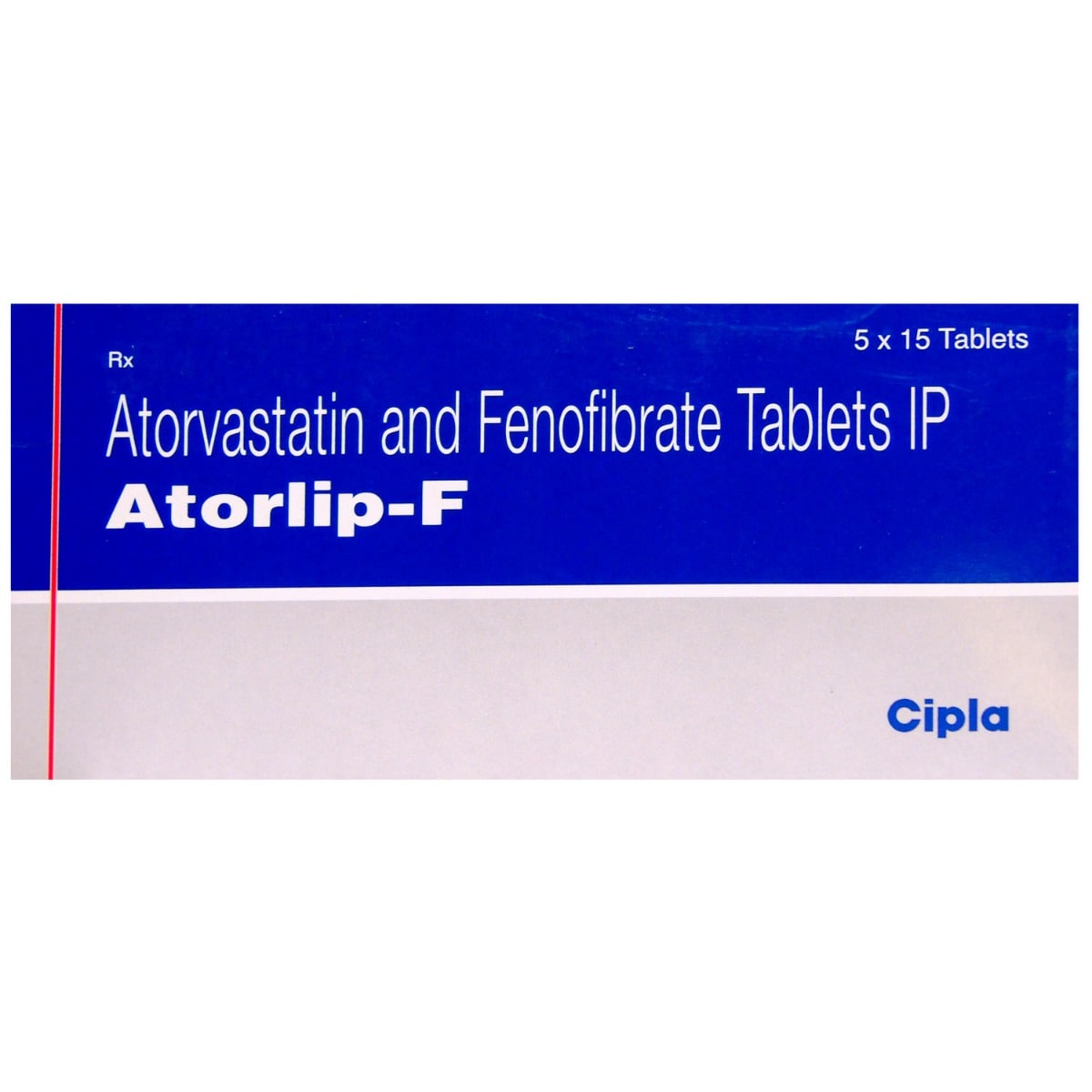Avicus-F Tablet 10's
MRP ₹159
(Inclusive of all Taxes)
₹23.9 Cashback (15%)
Provide Delivery Location
Online payment accepted
 Prescription drug
Prescription drugWhats That
Composition :
Manufacturer/Marketer :
Consume Type :
Expires on or after :
Return Policy :
About Avicus-F Tablet
Avicus-F Tablet belongs to the class of medicines called antilipemic (lipid-lowering medicines) primarily used in the treatment of high lipid levels (cholesterol and triglycerides levels) and prevention of heart diseases and blood vessel blockage. Hyperlipidemia or hypertriglyceridemia is a condition in which there is a high level of low-density lipoproteins (LDL) or bad cholesterol and a decreased level of high-density lipoprotein (HDL) or good cholesterol. Increased level of bad cholesterol leads to a high risk of heart attack and stroke in the future, especially in patients with heart disease.
Avicus-F Tablet is composed of two medicines, namely: Atorvastatin (HMG-CoA reductase inhibitor) and Fenofibrate (fibrates). Atorvastatin is a lipid-lowering medication that blocks the enzyme HMG-CoA reductase required to make cholesterol in the body. As a result, it lowers the bad cholesterol (low-density lipoproteins or LDL), and triglycerides (TG) and increases the levels of good cholesterol (high-density lipoproteins or HDL). Fenofibrate is another lipid-lowering agent which works by increasing the natural substance (lipoprotein lipase) that breaks down fats in the bloodstream thereby increasing its utilization and removal. As a result, it decreases harmful cholesterol like LDL (bad cholesterol), and triglycerides (TG) and increases levels of HDL (good cholesterol).
Take Avicus-F Tablet as prescribed. Your doctor will advise how often you take Avicus-F Tablet based on your medical condition. In some cases, you may experience allergic reactions, hyperglycemia (excess of glucose in the bloodstream), headache, blurred vision, stomach pain, constipation, headaches, joint swelling (edema), joint pain, muscle pain, back pain, slow heart rate, and nausea. Most of these side effects of Avicus-F Tablet do not require medical attention and gradually resolve over time. However, if the side effects are persistent, reach out to your doctor.
If you are allergic to Avicus-F Tablet or any component present in it namely atorvastatin or fenofibrate, please tell your doctor. If you are pregnant or breastfeeding, have hypothyroidism, drink more than 2 servings of alcohol per day, and have a muscle disorder (fibromyalgia) it is advised to inform your doctor before using Avicus-F Tablet . Avicus-F Tablet is not recommended for children below 12 years of age, as the safety and effectiveness were not established. If you experience yellowing of the skin (Jaundice), allergic reaction, cramps, or muscle weakness then immediately contact your doctor.
Uses of Avicus-F Tablet
Directions for Use
Key Benefits
Avicus-F Tablet taken with dietary measures helps in the treatment of high cholesterol and prevention of life-threatening conditions to the heart, especially for heart patients when initial dietary measures fail to lower cholesterol. It helps in lowering the bad cholesterol (LDL) and increases the level of good cholesterol (HDL) in the state of dyslipidemia or hyperlipidemia. Avicus-F Tablet also lowers the amount of fat or cholesterol deposition (plaque) in the arteries of the heart thereby reducing the chance of having a heart attack or stroke in the future.
Storage
- Consult your doctor if you experience nasal congestion, runny nose, or sinus pressure after taking medication.
- Your doctor may adjust your treatment plan by changing your medication, adding new medications, or providing guidance on managing your rhinitis symptoms.
- If advised by your doctor, use nasal decongestants or saline nasal sprays to help relieve nasal congestion.
- Practice good hygiene, including frequent handwashing, avoiding close contact with others, and avoiding sharing utensils or personal items.
- Stay hydrated by drinking plenty of water and other fluids to help thin out mucus and soothe your nasal passages.
- Please inform your doctor about joint pain symptoms, as they may adjust your medication regimen or prescribe additional medications to manage symptoms.
- Your doctor may prescribe common pain relievers if necessary to treat joint discomfort.
- Maintaining a healthy lifestyle is key to relieving joint discomfort. Regular exercise, such as low-impact sports like walking, cycling, or swimming, should be combined with a well-balanced diet. Aim for 7-8 hours of sleep per night to assist your body in repairing and rebuilding tissue.
- Applying heat or cold packs to the affected joint can help reduce pain and inflammation.
- Please track when joint pain occurs and any factors that may trigger it, and share this information with your doctor to help manage symptoms.
- If your joint pain is severe or prolonged, consult a doctor to rule out any underlying disorders that may require treatment.
- Drink water or other clear fluids.
- To prevent worsening of pain, limit intake of tea, coffee, or alcohol.
- Include bland foods like rice, toast, crackers, and rice in your diet.
- Avoid lying down immediately after eating as it may cause indigestion or heartburn.
- Avoid acidic and spicy food as it may cause indigestion.
- Inform Your Doctor: Notify your doctor immediately about your diarrhoea symptoms. This allows them to adjust your medication or provide guidance on managing side effects.
- Stay Hydrated: Drink plenty of fluids to replace lost water and electrolytes. Choose water, clear broth, and electrolyte-rich drinks. Avoid carbonated or caffeinated beverages to effectively rehydrate your body.
- Follow a Bland Diet: Eat easy-to-digest foods to help firm up your stool and settle your stomach. Try incorporating bananas, rice, applesauce, toast, plain crackers, and boiled vegetables into your diet.
- Avoid Trigger Foods: Steer clear of foods that can worsen diarrhoea, such as spicy, fatty, or greasy foods, high-fibre foods, and dairy products (especially if you're lactose intolerant).
- Practice Good Hygiene: Maintain good hygiene to prevent the spread of infection. To stay healthy, wash your hands frequently, clean and disinfect surfaces regularly, and avoid exchanging personal belongings with others.
- Take Anti-Diarrheal Medications: If your doctor advises, anti-diarrheal medications such as loperamide might help manage diarrhoea symptoms. Always follow your doctor's directions.
- Keep track of your diarrhoea symptoms. If they don't get better or worse or are accompanied by severe stomach pain, blood, or dehydration signs (like extreme thirst or dark urine), seek medical help.
- Abnormal liver function requires immediate medical attention. Your doctor may recommend lifestyle modifications along with needed medication.
- Avoid intake of alcohol as it has a direct impact on liver functioning.
- Prevent medications like paracetamol, over-the-counter painkillers or those mentioned by your doctor, as they may have issues getting metabolised in your body.
- If you have overweight issues, losing weight can be a good thing to manage abnormal liver function.
- Cut down the number of fatty foods that are taken daily.
Drug Warnings
A patient should consult a doctor before taking Avicus-F Tablet if a patient has had a previous stroke with bleeding into the brain or have small pockets of fluid in the brain from previous strokes, or has kidney problems. has under-active thyroid gland (hypothyroidism), has repeated or unexplained muscle aches or pains, has a personal history or family history of muscle problems, has previous muscular problems during treatment with other lipid-lowering medicines (e.g. other ‘-statin’ or ‘-fibrate’ medicines), drinks a large amount of alcohol, has a history of liver disease, is older than 70 years, has diabetes, especially Type 2 diabetes, that is not well controlled or has problems with certain proteins in your blood.
Drug-Drug Interactions
Drug-Drug Interactions
Login/Sign Up
Taking Avicus-F Tablet with Posaconazole can increase the blood levels of Avicus-F Tablet. This can increase the risk of side effects.
How to manage the interaction:
Although there is an interaction between posaconazole with Avicus-F Tablet, they can be taken together if advised by your doctor. However, contact the doctor if you experience unexplained muscle pain, weakness, fever, chills, joint pain or swelling, unusual bleeding, skin rash, itching, loss of appetite, fatigue, nausea, vomiting, dark coloured urine, or yellowing of the skin or eyes. Do not discontinue any medications without consulting a doctor.
Taking Avicus-F Tablet with Pitavastatin can increase the risk of muscle problems like liver damage and rhabdomyolysis (the breakdown of skeletal muscle tissue).
How to manage the interaction:
Although there is a possible interaction between Pitavastatin and Avicus-F Tablet, you can take these medicines together if prescribed by a doctor. However, if you experience unexpected bruising or bleeding, skin rash, itching, exhaustion, nausea, vomiting, yellowing of the skin or eyes, unexplained muscular pain, tenderness, or weakness, fever, dark urine, chills, joint pain, or swelling, consult a doctor. Do not discontinue any medications without consulting a doctor.
When Avicus-F Tablet is used with cerivastatin, the risk of adverse effects such as liver damage and rhabdomyolysis, an uncommon but serious illness involving the breakdown of skeletal muscle tissue, increases. Rhabdomyolysis can cause kidney damage.
How to manage the interaction:
Although taking Avicus-F Tablet and Cerivastatin together can cause an interaction, it can be taken if a doctor has suggested it. If you experience unexplained muscular pain, soreness, or weakness while taking these drugs, inform a doctor immediately, especially if these symptoms are accompanied by fever or dark-colored urine. Furthermore, if you develop a fever, chills, joint pain or swelling, unusual bleeding or bruising, skin rash, itching, loss of appetite, fatigue, nausea, vomiting, dark-colored urine, and/or yellowing of the skin or eyes, consult a doctor immediately. Do not stop using any medications without a doctor's advice.
Mipomersen may cause liver problems and using it with Avicus-F Tablet may increase that risk.
How to manage the interaction:
There may be a possibility of interaction between Avicus-F Tablet and Mipomersen, but it can be taken if prescribed by a doctor. If you have any of these symptoms, it's important to contact a doctor right away: liver damage, fever, chills, joint pain, swelling, bruising, skin rash, itching, loss of appetite, fatigue, nausea, vomiting, abdominal pain, dark urine, or bleeding. Do not stop using any medications without a doctor's advice.
When atorvastatin is used with Avicus-F Tablet, it increases the risk of side effects such as liver damage, rhabdomyolosis (uncommon illness characterized by the breakdown of skeletal muscle tissue).
How to manage the interaction:
Although taking Avicus-F Tablet and atorvastatin together can cause an interaction, it can be taken if a doctor has suggested it. However, if you experience muscle pain, tenderness, or weakness, accompanied by fever or dark colored urine, chills, joint pain or swelling, unusual bleeding or bruising, skin rash, itching, loss of appetite, fatigue, nausea, vomiting, dark colored urine, light colored stools, and/or yellowing of the skin or eyes, you should consult the doctor. Do not stop using any medications without talking to a doctor.
When Avicus-F Tablet is used with pravastatin, it increases the chance of adverse effects such as liver damage and rhabdomyolysis, an uncommon but deadly illness characterised by the destruction of skeletal muscle tissue. Rhabdomyolysis can cause kidney damage.
How to manage the interaction:
Co-administration of Avicus-F Tablet with Pravastatin can result in an interaction, but it can be taken if a doctor has advised it. Inform a doctor immediately, if you have unexplained muscular pain, soreness, or weakness while taking these medications, especially if these symptoms are accompanied by fever or dark-colored urine. Furthermore, if you develop a fever, chills, joint pain or swelling, unusual bleeding or bruising, skin rash, itching, loss of appetite, fatigue, nausea, vomiting, dark-colored urine, or yellowing of the skin or eyes, consult the doctor immediately.
The combined use of Nicotine and Avicus-F Tablet can increase the blood levels and effects of nicotine. This can increase the risk or severity of side effects.
How to manage the interaction:
Co-administration of Nicotine and Avicus-F Tablet can lead to an interaction, it can be taken if advised by a doctor. If you experience any symptoms like irritation and burning sensation in the mouth and throat, increased salivation, nausea, abdominal pain, vomiting and diarrhea, contact a doctor immediately. Do not discontinue any medications without consulting the doctor.
Co- administration of Avicus-F Tablet with teriflunomide can cause liver issues and taking it with other medications that might harm the liver, such as Avicus-F Tablet, can enhance the risk.
How to manage the interaction:
There may be a possibility of interaction between Teriflunomide and Avicus-F Tablet, but it can be taken if prescribed by a doctor. However, if you have a fever, chills, joint pain or swelling, unusual bleeding or bruising, skin rash, itching, loss of appetite, fatigue, nausea, vomiting, abdominal pain, dark-colored urine, light-colored stools, and/or yellowing of the skin or eyes, consult the doctor immediately. Do not stop using any medications without a doctor's advice.
Taking Warfarin together with Avicus-F Tablet can increase the risk of bleeding.
How to manage the interaction:
Although taking Avicus-F Tablet and Warfarin together can result in an interaction, they can be taken together if prescribed by a doctor. However, if you experience unusual bleeding, bruising, vomiting, blood in your urine or stools, headache, dizziness, or weakness consult a doctor immediately. Do not stop using any medications without consulting a doctor.
The use of Avicus-F Tablet and simvastatin can increase the risk of a rare condition called rhabdomyolysis (breakdown of skeletal muscle tissue), rhabdomyolysis can cause kidney damage. If you are elderly or have preexisting kidney disease, the risk may increase.
How to manage the interaction:
Co-administration of Avicus-F Tablet and simvastatin can lead to an interaction, it can be taken if advised by a doctor. However, if you experience any symptoms like muscle pain, tenderness, weakness, fever, or dark-colored urine, consult the doctor immediately. Do not stop using any medications without a doctor's advice.
Drug-Food Interactions
Drug-Food Interactions
Login/Sign Up
Grapefruit Juice
How to manage the interaction:
Blood levels of atorvastatin can rise after consuming grapefruit juice. Before quitting the drug, speak to a doctor even though there may be an interaction. Additionally, if you experience fever, chills, joint pain or swelling, unusual bleeding or bruising, skin rash, itching, exhaustion, nausea, vomiting, dark urine, or yellowing of the skin or eyes, you should consult a doctor. Without first consulting your doctor, never stop taking the medication.
Diet & Lifestyle Advise
- Eating a proper diet (such as a low-cholesterol/low-fat diet), other lifestyle changes that may help this medication work better include exercising, losing weight if overweight, and stopping smoking.
- It is best to limit or avoid alcoholic drinks while you are taking this medicine.
- Using this medicine with alcohol can lead to additive side effects such as increased drowsiness. Do not drive or operate machinery if you are drinking alcohol-containing beverages.
- If you notice slurred speech, confusion, severe weakness or difficulty breathing, contact your health care provider immediately.
- Try aromatherapy, yoga, and meditation to help relax your body and mind.
- Try to do breathing exercises to get more oxygen.
- Eat a healthy diet especially rich in soluble fibers like beans, legumes, whole grains, flax, apples, and citrus fruits.
- Try to replace most of your saturated fats with unsaturated fats that can reduce total cholesterol and LDL cholesterol in a short period. Foods like avocados, olive oil, fatty fish, and nuts contain lots of heart-healthy unsaturated fats, so it’s beneficial to eat them regularly.
- Try to adopt a Mediterranean-style diet rich in olive oil, fruits, vegetables, nuts, whole grains, and fish, and lower the consumption of red meat.
- Try to give priority to more fruits and veggies in your daily meal as these contain antioxidants that help to lower LDL.
Side Effects of Avicus-F Tablet
- Muscle pain
- Muscle weakness
- Joint pain
- Back pain
- Stuffy/runny nose or nose bleeds
- Headache
- Blurred vision
- Increased liver enzymes
- Allergic reactions
- Hyperglycaemia (excess of glucose in the bloodstream)
- Constipation
- Nausea
- Diarrhea
Habit Forming
Therapeutic Class
All Substitutes & Brand Comparisons
RX
Out of StockLipira F Tablet 10's
Emcure Pharmaceuticals Ltd
₹9.29
(₹0.84 per unit)
94% CHEAPERRX
Medistatin F Tablet 10's
Xemex Life Sciences
₹93
(₹8.37 per unit)
41% CHEAPERRX
Out of StockBettor Plus Tablet
Brilliant LifeSciences Pvt Ltd
₹98
(₹8.82 per unit)
38% CHEAPER
Author Details
We provide you with authentic, trustworthy and relevant information
Drug-Diseases Interactions
Drug-Diseases Interactions
Login/Sign Up
FAQs
Drug-Drug Interactions Checker List
- TETRACYCLINE
- GENTAMICIN
- MICONAZOLE
- FLUCONAZOLE
- CYCLOSPORINE
- VERAPAMIL
- DILTIAZEM
Disease/Condition Glossary
The cholesterol in blood comes from two sources: the foods you eat and the liver. The liver makes all the cholesterol that is essential for healthy cell membranes, brain functioning, hormone production, and vitamin storage. Excess cholesterol is bad for health. There are two types of cholesterol namely 'bad cholesterol' and 'good cholesterol. Bad cholesterol comprises low-density lipoprotein (LDL) and triglycerides (TG) while good cholesterol consists of high-density lipoprotein (HDL). Usually, there are no specific symptoms of raised or high levels of cholesterol but a large deposition of cholesterol in the arteries (plaque) of the heart. Blocked artery or plaque formation in the arteries of the heart can lead to chest pain, heart attack, or stroke.

Have a query?
Alcohol
Safe if prescribed
Avoid drinking alcohol with Avicus-F Tablet . It can raise triglyceride levels and may increase your risk of liver damage.
Pregnancy
Consult your doctor
Strictly prohibited as the drug is contraindicated in pregnant women since the safety in pregnant women has not been established .If the patient becomes pregnant while taking this drug, therapy should be discontinued and the patient should be apprised of the potential harm to the fetus.
Breast Feeding
Consult your doctor
As limited data is available on use of Avicus-F Tablet in breastfeeding mothers. It is strongly advise to consult a doctor before taking this drug.
Driving
Safe if prescribed
Absolutely safe to use while driving as no effect on motor coordination & state of mind has been reported. However, do not drive if this medicine affects your ability to drive.
Liver
Consult your doctor
Caution is to be taken as Avicus-F Tablet and liver interactions have been reported and should be avoided in patients with underlying liver disease, consult a doctor before taking this drug is mandatory.
Kidney
Consult your doctor
No serious interaction between Avicus-F Tablet and kidney has been reported. A patient is advised to consult a doctor as fenofibrate can affect kidney functioning.
Children
Safe if prescribed
Not recommended in children. Consult a doctor before taking this drug.











